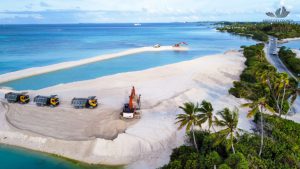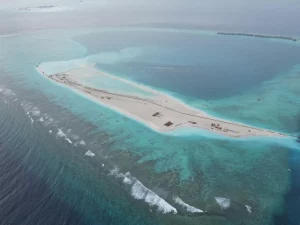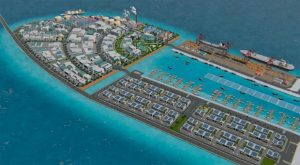In the face of escalating sea levels and a burgeoning population, the Maldives has embarked on an ambitious journey of land reclamation. As of 2023, a series of ongoing projects are reshaping the nation’s geography, offering both opportunities and challenges for the environment and economy. This intricate interplay between development and ecological considerations has captured global attention.
Driven by the pressing need for additional space, the Maldives government has initiated a series of land reclamation projects. These endeavors, while intended to create land for resorts and industries, have ignited a significant debate centered around their potential impact on UNESCO reserves and delicate marine ecosystems.

A pivotal player in this transformation is the distinguished Dutch firm, Van Oord. Their involvement in a massive project to reclaim 194 hectares of land in Addu City underscores the international interest and expertise invested in the Maldives’ land expansion endeavors. This collaboration signifies the global nature of the challenge and the collective effort required to find sustainable solutions.

Support from the scientific community has been instrumental in shaping these reclamation projects. Researchers have developed decision-support tools aimed at identifying suitable locations for reclamation, with the aim of mitigating adverse consequences. These tools empower stakeholders to make informed choices that prioritize both development and environmental protection, thereby ensuring a harmonious coexistence.
The process of land reclamation involves the strategic deposition of sand to create artificial islands. Employing large pipes to inject tons of sand above existing reefs has proven crucial in expanding land areas while safeguarding fragile marine ecosystems. This technique highlights a delicate balance between progress and preservation that characterizes the Maldives’ approach.

Among the ongoing projects, Ukulhas Island, Gulhi Falhu,Thilafushi , and Giraavaru stand as noteworthy examples. Each initiative contributes not only to the Maldives’ urban development but also to its economic growth. These projects represent a tangible manifestation of the nation’s dedication to achieving a harmonious equilibrium between progress and sustainability.
One standout project is the Kunburudhoo land reclamation, currently at 52% completion. Combining dredging and land reclamation operations, this endeavor exemplifies the intricate nature of these projects and the multi-faceted strategies employed to create new land areas.

In summation, the ongoing land reclamation projects in the Maldives epitomize the nation’s proactive response to the challenges posed by climate change and rapid urbanization. These ventures are not only a testament to international cooperation and scientific advancements but also a reflection of the Maldivian government’s resolute commitment to fostering sustainable development amid environmental uncertainties. As the projects continue to unfold, finding the delicate equilibrium between progress and preservation will undoubtedly remain a top priority for all stakeholders involved.


